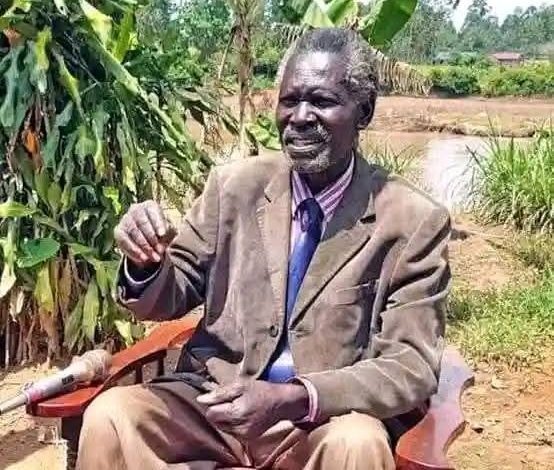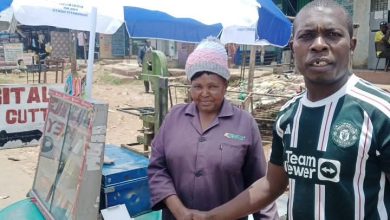Sukuma Bin Ongaro: The Unstoppable beat of Kenyan Music soul.

By Bob Anyula | GoodMorningKenya.co.ke
“I was just pushing with the solo guitar… and people listened.” – Sukuma Bin Ongaro
Born in 1946 in the rural village of Ebukambuli, Mulwanda (Kakamega County), Wilson Omutere Ongaro—better known by his stage name Sukuma Bin Ongaro—rose from a life of hardship to become one of Kenya’s most influential Benga musicians. His story is one of raw talent, determination, and spiritual transformation.
From Herding Cattle to Crafting a Guitar
Ongaro’s early life was steeped in struggle. After losing his father at a young age, he was raised by his mother, Jessica Kubondo, who brewed busaa—a traditional alcoholic drink—to support her eight children.
Unable to attend school, Ongaro spent his days herding cattle and helping his mother. Yet he absorbed Kiswahili and English informally through conversations with friends. His true education came from the family radio, where he discovered the sounds of David Amunga and Isaiah Mwinamo.
At just 13, he built his first makeshift guitar from a kitchen sieve. Though crude, the instrument drew curious neighbors—marking the beginning of a lifelong musical journey.
A Journey to Nairobi — Paid for by a Cow
In 1962, Ongaro left for Nairobi, his fare paid by his mother who sold one of their cows. Homeless upon arrival, he slept at the railway station before a neighbor introduced him to his idol, David Amunga.
That meeting led to the recording of his first two songs:
Ongaro Alikufa (a tribute to his late father)
Leunidah Ang’iyo
He was paid Sh50—a fee that came with a painful lesson: Amunga retained the song rights, and Ongaro never earned from them again.
The Rise of a Music Giant
Despite that initial setback, Ongaro’s unique sound—marked by his expressive solo guitar style—captivated listeners. He called it “pushing hard,” and the name Sukuma (Swahili for push) was born.
Soon, his career took off with a series of increasingly lucrative recording deals:
Sang’alo Studios – Sh300 per track
Chandarana Records – Sh600
Kundi Studios – Sh1,000
Oluoch Kanindo – Sh2,000
His influence grew rapidly across Western Kenya, making him a household name.
Songs That Shaped Generations
Sukuma’s songs were not just for entertainment—they were social commentaries. He sang of love, labor, migration, and injustice, blending humor and truth in equal measure.
Some of his most iconic hits include:
Ndatsia Mombasa
Wacha Waseme
Kazi ya Msumeno Imenishinda
Kila Siku Suku
Oluchendo Lwe Mwalo
Amajini Keshirandu
Jirani Kuno
Malaba Border
Nerea Utaolewa Lini?
His signature sound became known as the “Omutibo beat”, forever linked to the soul of Western Kenya.
Fame, Fortune… and Regret
At his peak, Sukuma lived lavishly. He reportedly earned up to Sh150,000 per night, but often had nothing left by morning.
He openly admitted to having over 50 wives over the years, though only two—Beatrice Ayoyi and Rose Khatenje—remained with him in the long term. He fathered many children and eventually regretted how fame and excess strained his family life.
Gospel Awakening: Sukuma Becomes “Bin Yesu”
Around 2010, Ongaro underwent a spiritual transformation. He became born-again and changed his name to Willy Sukuma Bin Yesu, channeling his energy into gospel music.
His popular gospel releases include:
Ongaro Amepata Yesu
Mapasta
Sikujua Nitaokoka
This new chapter saw him embrace humility, faith, and community service.
Legacy: The Ongaro Junior Band
Sukuma’s legacy lives on through his children. His firstborn, Charles Ongaro (aka Ongaro Junior), now leads the Ongaro Junior Band. His youngest son, Lucas Amakobe, performs as a dancer in the group.
Floods and a Community’s Gift
In his later years, Sukuma’s home was destroyed by floods from the River Yala. But the community did not forget their hero. Former schoolmates raised Sh1.8 million to build him a new, modern house—a sign of deep respect for his contribution to Kenyan culture.
No Royalties, No Recognition
Despite a catalogue of over 100 songs, Sukuma revealed that he never received royalties from the Music Copyright Society of Kenya (MCSK). He expressed frustration that funds were likely mismanaged—a common plight among Kenya’s musical pioneers.
The Lasting Legacy of Sukuma Bin Ongaro
Sukuma Bin Ongaro’s life was one of rhythm, resilience, and reinvention. From a cattle herder to a national treasure, his music continues to echo in matatus, market stalls, and family gatherings across the country.
Though the man may no longer perform as often, his Omutibo beat remains timeless.
Story by: Bob Anyula
Images Courtesy of Family Archives / Contributors






